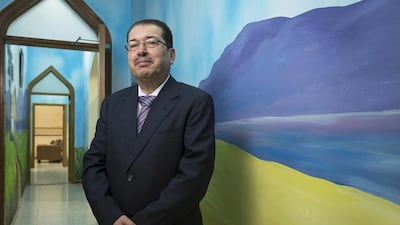SHARJAH // The director of Sharjah’s children’s hotline has dealt with many young people traumatised by divorce, so he is working on educating parents about keeping their offspring distanced from marital problems and bitter break-ups.
Ahmad Al Tartor, 57, is on a mission to give children the best opportunity of having a normal upbringing.
“Children of failed marriages are frail, especially from Arab families, they are psychologically traumatised after living in a very negative environment at home, where parents often use them as leverage to gain points over the other parent,” he says.
He is working with the media, civic societies and Sharjah courts to try to get parents going through a separation or divorce to keep their children away from the process.
“The child is a product of the relationship, and not part of the relationship. Children should be away from all the problems at all times. It should be a mantra,” Mr Al Tartor says.
After graduating with a bachelors of law from Alexandria University in 1982, he completed a diploma in Islamic studies at the Arab University in Cairo, before he came to the UAE in 1984.
He earned another diploma, in human rights, from Dubai Police, and married in 1988.
He worked at Sharjah social services department until he was assigned to run the children’s hotline in 2007, which was the first of its kind in the country.
“I have a great disdain for child violence. I can’t bear the thought of a vulnerable child getting hurt or abused; it is why I come to work every day, to try to help children as much as I can,” says the father of three boys and a girl.
Another problem he sees often is parents speaking ill of their spouses.
“Some parents foul mouth their spouses in front their children, often resulting in the child resenting a parent, them being fearful and other negative characteristics,” says the Palestinian. “Not two days ago, a father of boys aged 8 and 10 came in. He started speaking ill about their mother in a very bad and harmful way. When I told him to stop, he responded saying let the children know and listen what their mother is.”
The effects of bitter relationships and divorces sink in with children, he says.
“I was talking to an 11-year-old girl from a divorced family when she told me that she will never get married. She told me that she did not want to relive what her mother went through,” says Mr Al Tartor.
As part of his daily job, Mr Al Tartor sees all kinds of child abuse – mothers dumping their out-of-wedlock newborns on streets and in bins, to divorced parents abandoning their child.
“I can sometimes understand why a mother would abandon her child, maybe to save herself from being charged with adultery and conceiving outside of wedlock,” he says. However, there was one incident that has stuck with him for years.
“A divorced couple got remarried to others and neither of the new partners wanted to raise the child from the previous marriage. So they came here and asked what the solution was to their problem, to which I answered that we have a children’s home. The parents left the child at the centre and each went their separate way.”
He drove home that day saddened by the fact that two adults would simply abandon a vulnerable child and go on with their lives.
“I still can’t fathom how they could abandon their flesh and blood that way,” says Mr Al Tartor.
tzriqat@thenational.ae
